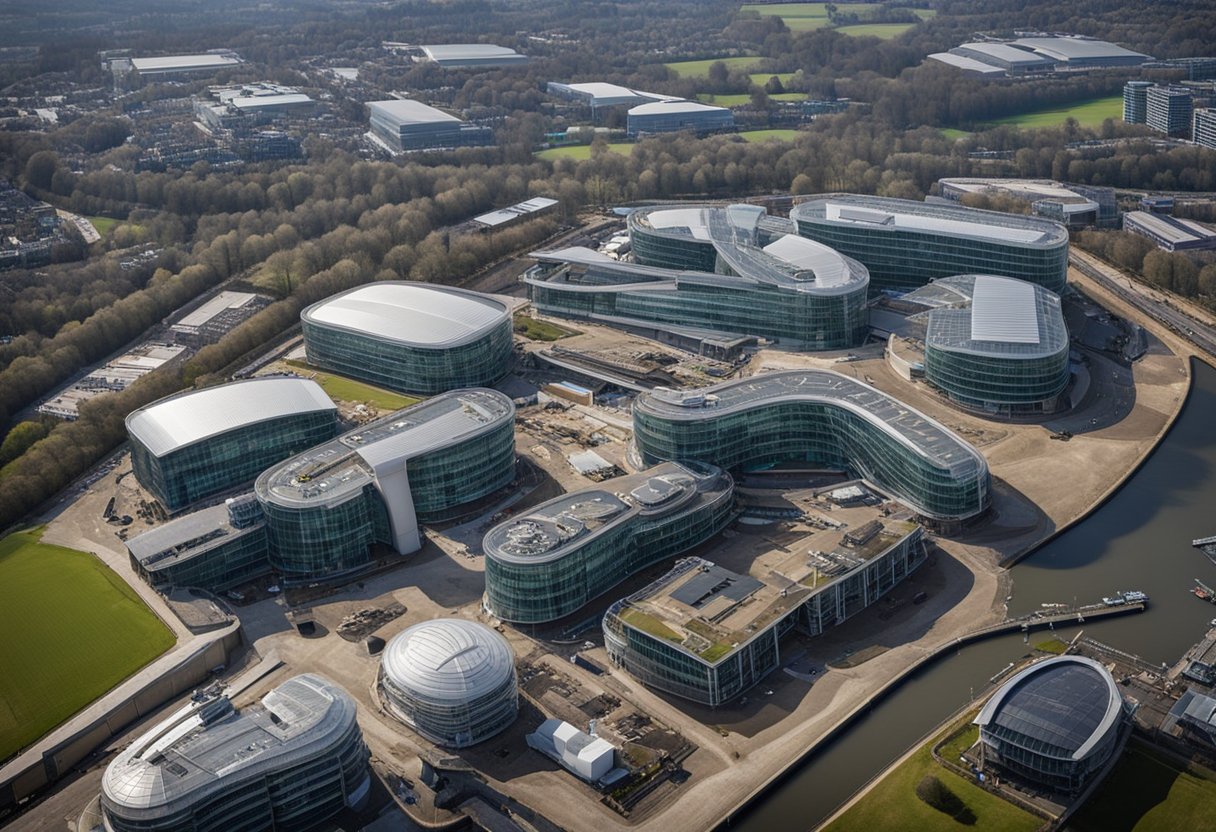Discover how Britain’s top construction companies are reshaping skylines and setting new industry standards with groundbreaking innovations and sustainable practices.
The Evolution of UK Construction Giants
The UK construction industry has witnessed remarkable transformation over recent decades, with industry leaders like Balfour Beatty and Morgan Sindall at the forefront of innovation. Balfour Beatty, established in 1909, has evolved from a traditional builder to a technology-driven construction powerhouse, managing iconic projects such as Crossrail and the Olympic Stadium. Their adaptation to modern challenges has set new industry standards, with the company reporting a robust £8.7 billion order book in 2024. Morgan Sindall, founded in 1977, has similarly transformed the sector with its innovative approach to urban regeneration and infrastructure development, employing over 6,700 professionals across the UK. These companies, along with other major players like Kier Group and Amey UK, have maintained their market dominance through strategic adaptation to changing market demands and technological advancement.
Technology-Driven Innovation in Construction
The UK’s leading construction firms are leveraging cutting-edge technology to revolutionise building methods and project delivery. Digital transformation has become a cornerstone of modern construction practices, with companies investing heavily in advanced solutions that enhance efficiency and accuracy.
- Digital twin technology and Building Information Modelling (BIM) are now standard practices, with 89% of major UK contractors using BIM Level 2 or higher
- Automated construction processes, including robotics and autonomous equipment, have increased productivity by up to 30% on large-scale projects
- AI and machine learning applications are being used for predictive maintenance and risk assessment, reducing project delays by 15-20%
- Remote project management solutions have enabled real-time monitoring and decision-making, improving project delivery times by 25%
Sustainable Building Practices
Sustainability has become a central focus for the UK’s top construction companies, with major firms committing to ambitious environmental targets. Balfour Beatty has pledged to achieve net-zero carbon emissions by 2040, while Morgan Sindall has implemented comprehensive sustainability frameworks across all projects. The industry has seen a 40% reduction in carbon emissions since 2020, with leading firms pioneering new approaches to sustainable construction. Companies are increasingly adopting circular economy principles, with 75% of construction waste now being recycled or repurposed. The implementation of green building standards has become a competitive advantage, with BREEAM excellence ratings becoming a prerequisite for major projects.
Modern Methods of Construction (MMC)
- Offsite manufacturing has reduced construction times by up to 50% while improving quality control
- Modular construction techniques have been adopted by 85% of top UK contractors, enabling faster project delivery
- Advanced prefabrication methods have reduced waste by 90% compared to traditional construction
- Quality control improvements through standardised processes have decreased defects by 70%
- Integration of smart building technologies has improved energy efficiency by 40%
Project Management Evolution
The transformation of project management practices has been fundamental to the success of leading UK construction companies. The adoption of integrated project delivery (IPD) approaches has revolutionised how projects are executed, with collaborative platforms enabling seamless communication between stakeholders. Risk management has evolved significantly, with sophisticated analysis tools helping companies identify and mitigate potential issues before they impact project delivery. Supply chain optimisation has become increasingly sophisticated, with real-time tracking and analytics ensuring efficient material flow and resource allocation. These advancements have contributed to a 30% improvement in project delivery times and a 25% reduction in cost overruns.
Financial Performance and Market Impact
The UK construction sector has demonstrated remarkable resilience and growth, with the top 100 construction companies collectively securing contracts worth £40.8 billion in 2024. Despite challenging economic conditions, the industry has seen aggregate turnover increase by 8.9% according to the latest TCI Top 100 review. While profit margins have experienced some pressure, declining to 1.7% from 2.7% in 2023, the sector remains stable with strong order books. The five largest publicly quoted construction companies – Balfour Beatty, Costain, Kier, Galliford Try, and Morgan Sindall – continue to dominate the market, accounting for a significant portion of major infrastructure projects.
The Future of UK Construction
Looking ahead, the UK construction industry is poised for continued innovation and growth. Industry leaders are investing heavily in research and development, with a focus on emerging technologies such as 3D printing, advanced materials, and autonomous construction systems. The sector is expected to see increased adoption of artificial intelligence and machine learning, with predictions suggesting that 50% of construction tasks will be automated by 2030. Sustainability will remain a key driver, with companies developing new solutions for carbon-neutral construction and circular economy principles. The integration of smart building technologies and IoT solutions is expected to transform how buildings are designed, constructed, and maintained.
Conclusion: Lessons for the Industry
The transformation of UK construction demonstrates the industry’s capacity for innovation and adaptation. Leading companies have shown that success in modern construction requires a balanced approach combining technological advancement, sustainable practices, and efficient project management. The sector’s evolution offers valuable lessons for professionals at all levels, highlighting the importance of embracing change while maintaining focus on quality and efficiency. As the industry continues to evolve, the companies that thrive will be those that successfully integrate new technologies and sustainable practices while maintaining strong financial performance and project delivery capabilities.
FAQ
What is the profit margin for builders in the UK?
What Is The Average Profit Margin In UK Construction? A 2021 study by consultant Turner & Townsend found that the UK construction sector had the lowest margins in the world at just 3.9% average, compared to 4.6% in North America and 6.1% in Continental Europe.
Who is the richest builder in the UK?
As a taster, the paper has revealed the ten richest house builders in this year’s rundown, with John Bloor of Bloor Homes (and Triumph) topping the table after another mega successful year that saw his eponymous firm churn out another 3,000 homes at an average selling price of £300k.
Sources
[1] https://www.theconstructionindex.co.uk/market-data/top-100-construction-companies/2024
[2] https://trackunit.com/articles/list-of-top-10-largest-construction-companies-in-the-uk/
[3] https://www.glenigan.com/construction-companies/


Leave a Reply